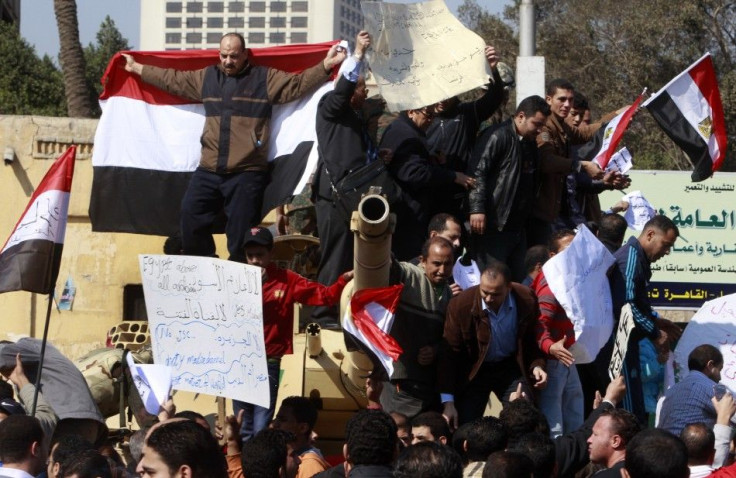Mubarak supporters attack Cairo protesters

Supporters of President Hosni Mubarak attacked protesters with fists, stones and clubs in Cairo on Wednesday as the Egyptian goverment rejected international calls for the leader to end his 30-year-rule now.
Anti-Mubarak protesters hurled stones back and said the attackers were police in plain clothes, a charge that the government denied.
The attack caused chaotic scenes in central Tahrir Square, some of the Mubarak supporters rode into the crowd on horses and camels and in carriages, wielding whips and sticks.
Opposition figurehead Mohamed ElBaradei, a Nobel Peace laureate, called on the army to intervene to stop the violence, the worst in the nine-day uprising against Mubarak since protesters fought street battles last Friday.
But troops stood by and watched.
The emergence of Mubarak loyalists, whether ordinary citizens or police, thrust a new dynamic into the momentous events in this most populous Arab nation of 80 million people.
The uprising broke out last week as public frustration with corruption, oppression and economic hardship under Mubarak boiled over.
The crisis has alarmed the United States and other Western goverments who saw Mubarak as a bulwark of stability in a volatile regional, and has raised the prospect of unrest spreading to other authoritarian Arab countries.
Mubarak went on national television on Tuesday night to say he would not stand in elections scheduled for September but this was not good enough for the protesters, who demanded he leave the country immediately.
U.S. President Barack Obama telephoned the 82-year-old to say Washington wanted him to move faster on political transition.
What is clear and what I indicated tonight to President Mubarak is my belief that an orderly transition must be meaningful, it must be peaceful and it must begin now, Obama said after speaking to him.
But Mubarak dug his heels in on Wednesday. A Foreign Ministry statement rejected U.S. and European calls for the transition to start immediately and said they aimed to incite the internal situation in Egypt.
International backing for Mubarak, for three decades a stalwart of the West's Middle East policy and defence against the spread of militant Islam, crumbled as he tried to brazen out the crisis.
France, Germany and Britain also urged a speedy transition.
Some of the few words of encouragement for him have come from oil-giant Saudi Arabia, a country seen by many analysts as vulnerable to a similar outbreak of discontent.
Israel, which signed a peace treaty with Egypt in 1979, is also watching the situation in its western neighbour nervously, weighing the possibility that anti-Israeli Islamists might gain a share of power.
FIGHTING IN THE SQUARE
Troops made no attempt to intervene as opposing factions clashed in the vast Tahrir (Liberation) Square, the focus of the protests.
Reuters correspondents saw dozens injured and many people fled in panic. But some anti-Mubarak protesters said they would not leave the square until Mubarak quits.
Khalil, a man in his 60s holding a stick, blamed Mubarak supporters and undercover security men for the clashes.
We will not leave, he told Reuters. Everybody stay put.
The Interior Ministry denied police were involved.
Earlier, the armed forces had told the protesters that their demands had been heard and it was time for them to clear the streets.
An opposition coalition, which includes Islamist organisation the Muslim Brotherhood, responded to the army warning by calling for more protests.
It said it would only negotiate with Vice President Omar Suleiman, a former intelligence chief appointed by Mubarak at the weekend, once Mubarak stepped down.
Mubarak's offer to leave in September was his latest gambit in the crisis. At the weekend he reshuffled his cabinet and promised reform but it was not enough for protesters.
One million people took to the streets of Egyptian cities on Tuesday calling for him to quit.
YEMEN, JORDAN FEEL THE HEAT
Many analysts see the army as trying to ensure a transition of power that would allow it to retain much of its influence.
Hani Sabra, a Eurasia Group analyst, said Mubarak's announcement he would not stand in the election in September marked the start of a long, messy negotiation process between the government and the opposition.
In the medium term, these negotiations will likely produce an Egypt best described as a hybrid democracy, combining a strong military with a more pluralistic electoral system, he said.
Mubarak's speech was formulated to superficially display his resolve. Mubarak also declared that he would die in Egypt, a direct reference to protesters who have demanded his departure.
The uprising was inspired in part by a popular revolt in Tunisia last month which overthrew long-ruling President Zine al-Abidine Ben Ali. The mood is spreading across the region.
King Abdullah of Jordan replaced his prime minister on Tuesday after protests there.
Yemeni President Ali Abdullah Saleh, a key U.S. ally in the fight against al Qaeda, said on Wednesday he would not seek to extend his presidency, a move that would end his three-decade rule in 2013.
Oil prices fell back from 28-month highs, but North Sea Brent crude was still more than $101 a barrel on worries that unrest in Egypt could trigger yet more political upheaval across the Middle East and North Africa.
But with Mubarak pledging to go, foreign investors have begun to show renewed interest in Egyptian bonds and stocks and the cost of insuring Egyptian debt against default fell.
© Copyright Thomson Reuters 2024. All rights reserved.




















